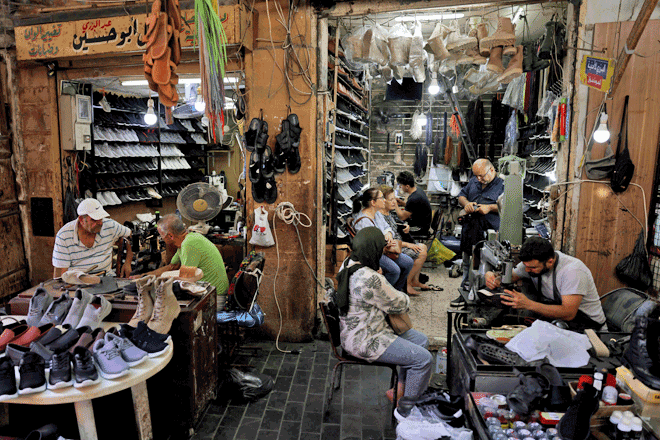You are here
In Lebanon, migrant workers hit by financial crisis
By AFP - Feb 28,2020 - Last updated at Feb 28,2020

Foreign workers are photographed in the Lebanese capital Beirut, on February 23 (AFP photo)
BEIRUT — Eighteen-year-old domestic worker Mary came to Lebanon to help support her family, but now a financial crisis is preventing her from sending money home to Ethiopia.
A crippling liquidity crunch in the Mediterranean country has drastically limited access to dollars, and tens of thousands of migrant workers toiling for remittances in the hard currency are suffering the backlash.
On a recent Sunday, Mary strolled down a bustling street in the capital Beirut with her girlfriends, dressed in an elegant outfit of skirt, jacket and ballerinas for her day off.
"I used to earn 400 dollars... but today I get my salary in Lebanese pounds," she said. "I can't send money to Ethiopia anymore."
Around her, migrant workers of all ages flocked to shops that sell imported food or clothes from home, the women in their Sunday best. Young men sat on the pavement outside calling centres and restaurants, music spilling out onto the street.
The Lebanese pound used to be easily exchangeable for dollars at a fixed rate, but now banks have capped withdrawals of the US currency and its value has plummeted on the parallel market.
The de-facto devaluation means Mary has lost at least a third of her salary.
But she insisted her employees were not to blame. The problem, she said, "is from the state".
'What will I do?'
In a wave of mass street protests since October 17, Lebanese have railed against what they condemn as a corrupt political class that has mismanaged the country.
An estimated quarter of a million domestic workers live in Lebanon, many in conditions that have repeatedly been condemned by their countries of origin and rights group, who point to the fact that many are underage.
The large majority of foreign workers hail from Ethiopia, but many also come from the Philippines, Bangladesh and Sri Lanka.
A sponsorship system known as "kafala" leaves maids, nannies and carers outside the remit of Lebanon's labour law, and at the mercy of their employers.
Thousands more foreign men work petrol pumps, clean the streets or labour in private businesses and restaurants.
Before Lebanon's economy went into meltdown, most of these workers earned the equivalent of $150 to $400 a month, often according to nationality.
But their salaries have now been de facto slashed amid the worst liquidity crisis to rock Lebanon since the end of its 1975-1990 civil war.
With access to dollars severely limited and the value of the local currency tumbling, many employers have decided to pay their employees in Lebanese pounds.
Migrant worker are then forced to exchange their local wages into foreign currency at a substantial loss on the black market.
"What will I do?" Mary asked. "My siblings are in school and I'm supposed to help my family, but now I can't."
After years of political turmoil, Lebanon's economy is collapsing, prices have soared, and businesses are struggling to stay open.
'No more dollars'
Thousands of Lebanese have been laid off or forced to take pay cuts, and foreign workers too are feeling the pinch.
Amandeep Singh, 23, has been working for four years in a plant nursery north of Beirut and sent money home to India.
He says his salary has suddenly been slashed from $500 to $360 after his employer decided to pay him half in pounds.
He was told the situation would improve soon.
"I'll wait and see," Singh said.
But "if there are no more dollars, there will be nothing left for me in Lebanon. I will go home to India".
The crisis saw more than 1,000 Filipinos flock to their embassy in December to sign up for free repatriation.
The mostly female domestic workers, some with children in tow, signed up for the free flight.
Jasmin Bighoun, 32-year-old female domestic worker from Bangladesh, said she used to be able to send $300 home to the family, but now that has dropped to just $150.
"There are no more dollars and everything is more expensive. It's not the same as before, life is hard," she said.
"My 'madame' says she has no more dollars... I can't do anything," she said.
If necessary, she and her husband will pack up and return to Bangladesh, she said.
Other migrant workers have already made up their minds.
Nav, an 18-year-old from Ethiopia who works as a cleaner for hourly wages, said the sacrifices are no longer worth it.
"They pay me in pounds," she said. "What's the point of staying? I want to leave."
By Layal Abou Rahal
Related Articles
SIDON — Among meandering alleyways in the historic market of Lebanon's southern city of Sidon, cobblers and menders are doing brisk business
By Layal Abou RahalAgence France-PresseBEIRUT — In many countries, public libraries are considered a dying relic amid the shift to digital,
BEIRUT — Petrol station owners in Lebanon on Friday suspended a strike and said they reached a deal with the government allowing them to pay

















